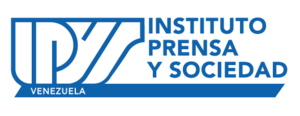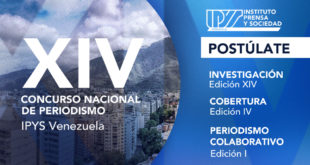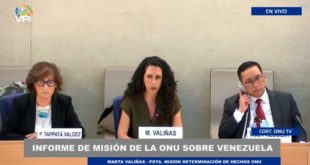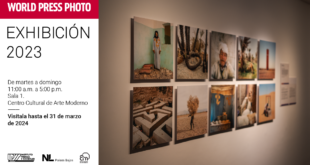El 17 de julio de 2013, en la audiencia preliminar se acordó iniciar un juicio contra el diario La Mañana, con sede en la ciudad de Coro, en el estado Falcón para dilucidar la demanda introducida en su contra por la Defensoría del Pueblo, órgano del poder ciudadano, debido a la publicación de fotografías presuntamente lesivas a la dignidad de los niños y adolescentes. Entre tanto, el 12 de julio, el mismo tribunal emitió una orden de censura por este caso. Los hechos se desarrollan al noroccidente del país.
En la audiencia de presentación tanto la Defensoría del Pueblo, representada por Zoremil Chirinos -juntos a sus abogados- así como el diario La Mañana, representado por Atilio Yánez y equipo jurídico, presentaron sus pruebas y no llegaron a conciliación alguna. Al término de la cita el tribunal admitió las pruebas de ambas partes. Actualmente, se espera la fecha del inicio del juicio oral y público, que se estima efectuarse en el mes de septiembre, luego de las vacaciones judiciales.
Previo al inicio de esta acción legal, el 12 de julio de 2013 a través de una medida cautelar, el tribunal prohibió al diario La Mañana la difusión de fotografías de sucesos hasta tanto no hubiese una decisión de este conflicto legal.
El periódico no ejerció una acción de oposición a la mencionada medida de censura, por lo que ésta quedó firme.
Según informó IPYS Venezuela, el 25 de junio de 2013, representantes del diario La Mañana fueron notificados de la demanda legal interpuesta por la Defensoría del Pueblo luego de la publicación de unas fotografías con contenido violento, que supuestamente atentaron contra “la integridad física, psíquica y moral” de los niños y adolescentes (http://ipys.org.ve/alerta?id=3514&y=2013&m=06). Atilio Yánez Plaza, director de La Mañana, aseguró a IPYS Venezuela que la demanda se hizo por la publicación de fotografías en cinco ediciones del año 2012.
Yánez informó que la Defensoría del Pueblo fue el órgano que activó el conflicto aun cuando, según sus funciones, debería fungir como institución mediadora en protección de los derechos de los ciudadanos.
Precedentes
Las discusiones entre el derecho a la protección de la infancia y la libertad de expresión en Venezuela tienen precedentes. En este marco se han emitido órdenes de censura para supuestamente proteger los derechos de los niños, niñas y adolescentes pero se ha afectado el derecho a la libre expresión y el derecho a la información de los ciudadanos.
De acuerdo a las alertas de IPYS Venezuela, el 17 de agosto de 2010, el Tribunal Décimo Segundo de Primera Instancia de Mediación y Sustanciación del Circuito Judicial de Protección de Niños, Niñas y Adolescentes de la Circunscripción Judicial del Área Metropolitana de Caracas y Nacional de Adopción Internacional, libró una medida preventiva innominada que ordena que todos los medios de comunicación impresos se abstuvieran de publicar imágenes de contenido “violento, sangriento, grotesco, bien sea de sucesos o no, que de una u otra forma vulneren la integridad psíquica y moral de los niños, niñas y adolescentes” venezolanos. 2 días después la acción de censura fue revocada (http://ipys.org.ve/alerta?id=1903&y=2010&m=08).
Otro caso ocurrió en 2006 cuando el Consejo Nacional de Derechos del Niño y del Adolescente (Cndna), notificó al diario Tal Cual del inicio de un proceso administrativo en su contra por la supuesta violación del derecho al honor, reputación y vida privada de la niña Rosinés Chávez Rodríguez, hija del presidente de la República, Hugo Chávez debido a un artículo de opinión del humorista Laureano Márquez publicado en el medio el 25 de noviembre de 2005. La medida impedía a Márquez publicar cualquier tipo de artículo y/o realizar un acto público que directa o indirectamente aluda a la hija del Presidente. Además, prohibió al director del diario, Teodoro Petkoff, publicar o difundir en cualquier medio de comunicación el mencionado artículo (http://ipys.org.ve/alerta?id=2579&y=2006&m=01).
Las acciones judiciales y las medidas de censura obstruyen el pleno derecho de los medios de comunicación y los periodistas a ejercer la libertad de expresión e información, por lo que también se afecta el derecho de los ciudadanos a conocer los asuntos noticiosos de interés público.
Etiqueta: censura previa, acción legal
___________________________________________________________________________
Lea la versión en inglés
Falcón: Court issued a gag order and imputed regional newspaper
On July 17, 2013, at the preliminary hearing agreed to initiate a lawsuit against La Mañana newspaper, based in Coro, Falcón state to elucidate on the lawsuit filed against it by the Ombudsman, an organ of citizens´ power, due to the publication of allegedly lewd photographs that could endanger the dignity of children and adolescents. Meanwhile, on July 12, the same court issued a gag order on this case. These events took place in the northwest part of the country.
At the presentation hearing the Ombudsman, represented by Zoremil Chirinos –together with her lawyers- as well as La Mañana newspaper, represented by Atilio Yánez and its legal team, presented their proof and evidence and reached no conciliation. At the end of the hearing the court admitted the proof from both parties. At present, the date for the start of the oral and public trial is not yet set, but is expected to be in September, after the summer vacations.
Prior to initiating this legal action, the court issued a precautionary measure on July 12, 2013, prohibiting newspaper La Mañana from publishing photographs on this case until a decision is arrived at.
The newspaper did not file a suit opposing the aforementioned gag order, so it is in place.
As informed by IPYS Venezuela, on June 25, 2013, representatives of La Mañana newspaper were given notice of the lawsuit filed by the Ombudsman after publishing photographs of a violent nature, which allegedly attempted against “the physical, psychical and moral integrity” of children and adolescents (http://ipys.org.ve/alerta?id=3514&y=2013&m=06). Atilio Yánez Plaza, director of La Mañana, assured IPYS Venezuela that the lawsuit was filed for the publication of photographs in five 2012 issues.
Yánez informed that the Ombudsman was the entity that activated the conflict although -according to its functions- it is supposed to act as a mediating entity in pro of the rights of the citizens.
Precedents
The discussions around the right to protect childhood and freedom of expression in Venezuela have precedents. Within this framework, gag orders have been issued supposedly to protect the rights of boys, girls and adolescents but the right to free expression has been affected as well as and the right of the citizens to receive information.
As per alerts issued by IPYS Venezuela on August 17, 2010, the twelfth court of the first instance for the mediation and decision-rendering of the judicial circuit of the metropolitan area of Caracas for the protection of boys, girls and adolescents and the domestic court for international adoptions issued an innominate preventive measure ordering all printed media to abstain from publishing images of a “violent, bloody, grotesque content, whether of events or not, that in any shape or manner violate the psychical and moral integrity of Venezuelan boys, girls and adolescents”. 2 days later, the gag order was revoked (http://ipys.org.ve/alerta?id=1903&y=2010&m=08).
Another case occurred in 2006 when the National Council for the Rights of Children and Adolescents (CNDNA) notified Tal Cual newspaper on the initiation of an administrative proceeding against it for the alleged breach of the right to the honor, reputation and privacy of Rosinés Chávez Rodríguez, daughter of the president of the republic Hugo Chávez due to an opinion article by humorist Laureano Márquez published in the media on November 25, 2005. The measure prevented Márquez from publishing any type of article and/or performing any public act that directly or indirectly alluded to the daughter of the president. It also prohibited Teodoro Petkoff, the director of the newspaper, from publishing or broadcasting the abovementioned article in any media (http://ipys.org.ve/alerta?id=2579&y=2006&m=01).
Legal actions and gag measures obstruct the full right of the media and the journalists to exercise their freedom of expression and information, so the right of the citizens to know about news of public interest is also thereby affected.
Label: prior censorship, legal action
 IPYS Instituto Prensa y Sociedad Venezuela
IPYS Instituto Prensa y Sociedad Venezuela



